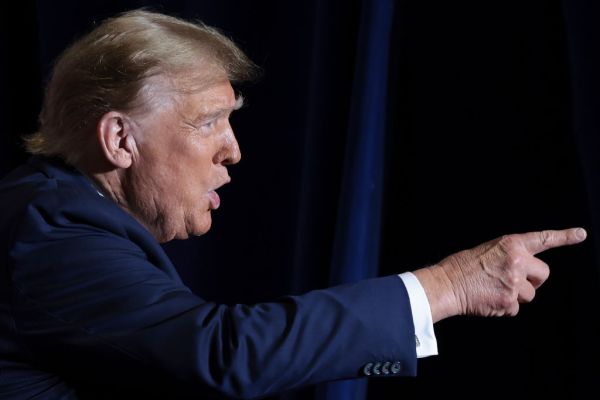The most insulting response to Liz Cheney endorsing Kamala Harris came from a mainstream Republican, not from a MAGA slobberer. Which makes sense.
The reason Donald Trump is in a position in 2024 to threaten his political enemies with mass arrest isn’t because of right-wing populists, of whom there aren’t enough to make a majority. It’s the partisan conservatives who know better—who could have followed Cheney but stuck with Trump—who have made this nightmare viable.
Rep. Dan Crenshaw was asked this weekend at an event in Texas what he thought of the Cheney endorsement. Crenshaw has distinguished himself as the rare House Republican who’s willing to throw a punch at Trump sycophants, which earned him a primary challenge in his district this year and charming nicknames from his detractors like “Eyepatch McCain.”
So if anyone still in the party might muster some grudging respect for her for refusing to bend the knee, one might think, it’s him. Nope. Crenshaw’s theory of why Cheney and former Rep. Adam Kinzinger are backing Harris is, to borrow a bit of internet lingo, that they’re butthurt. Trump’s frequent attacks on the two have made this “very personal” to them, he alleged, and now they’re “putting those feelings above, I think, basic conservative policy.”
The Trump fanatics calling Cheney a communist this week at least pay her the compliment of assuming that she takes her political convictions seriously. Crenshaw can’t understand her actions in terms of anything other than vulgar spite, a singular insult given that there is a vulgar, spiteful creature involved in the Trump-Cheney relationship, and it ain’t Liz.
No one on the American right is more prone to elevating grudges over conservative priorities than Trump himself. He’s not above costing his party Senate seats for the sake of indulging his personal grievances. As if to prove the point, he dubbed lifelong Republican Dick Cheney an “irrelevant RINO” this weekend after the former VP seconded his daughter’s endorsement of Harris. Personal loyalty to Trump and nothing more is the sine qua non of modern Republicanism, as pro-lifers, defense hawks, and fiscal conservatives continue to discover to their dismay.
Liz Cheney supported Trump in 2016 and 2020, turning against him only after his coup plot led to an attack on Congress. That should suffice to know which side of this feud has let personal animosity guide them. But if further evidence is needed, consider that Trump wasn’t the only Republican whose opponent was endorsed by Cheney in recent days:
If her antipathy to Trump is “very personal,” why is she also supporting Ted Cruz’s Democratic challenger in Texas’ Senate race?
Come to think of it, why is she supporting Ted Cruz’s Democratic challenger at all?
A ‘unique threat’?
Conservatives inside and outside The Dispatch wrestled with Cheney’s endorsement of Democratic Rep. Colin Allred over the weekend. Some outside observers mocked her for posturing as a conservative while working to hand total control of the federal government to Democrats. Others wondered why disliking Trump leads some on the right “to change their policies, their worldviews, and their endorsements all the way down.”
“Supporting Dems across the ballot undermines the argument about Trump being [a] unique threat,” Jewish Insider editor Josh Kraushaar noted of Cheney’s anti-Cruz position. One Dispatch colleague wondered if Cheney is taking a “burn it all down” approach to Republican candidates this year, hoping that a Democratic landslide up and down the ballot might at last break populism’s spell over the right.
All of that is wrong, I suspect. I can’t speak for Cheney, but I can tell you why I’m voting for Allred over Cruz—and it has nothing to do with policy or burning anything down.
Since January 6, the threshold question I ask when considering whether to vote for a Republican is how that candidate responded to Trump’s coup attempt. There’s a spectrum of behavior on that point, with Cheney and Kinzinger on one end, Trump himself on the other, and the mass of congressional Republicans somewhere in between.
At the two extremes of the spectrum, policy doesn’t matter to me. Policy debates are things you get to have when everyone agrees on the rules of the game. Rewarding those who defended democratic norms and punishing those who undermined them is more important.
I would vote for Cheney and every other Republican who voted to impeach or convict Trump following the insurrection in hopes that their victories would embolden others in the party to resist his power grabs in a second term. And I would vote against Trump and all of his co-conspirators for the opposite reason, in hopes that their defeats would convince others that civic crime, like trying to overturn an election on false pretenses, doesn’t pay.
Ted Cruz was Trump’s chief co-conspirator in the Senate after the 2020 election, initially agreeing to argue before the Supreme Court that the electoral votes of swing states won by Joe Biden should be thrown out. When the court declined to hear that case, Cruz switched to Plan B and ring-led a scheme on January 6 to stop Congress from certifying Biden’s victory by objecting to those swing-state electoral votes. Had he gotten his way, some sort of chaotic ad hoc election “commission” would have been thrown together before Inauguration Day to decide who the next president should be.
He did all of this knowing full well that Trump was and is a loon and that egging on Americans to doubt the fairness of their own elections will destabilize the country long-term. But he was willing to pay that price because he thought making himself useful to the coup would give him a leg up with Trump’s base when he runs for president again someday.
You don’t need to agree with Colin Allred on a single policy issue to grasp that a person like Ted Cruz cannot be trusted to defend the constitutional order. He was tested and failed grievously. If you believe that a second Trump presidency would create a “unique threat” to American government, as Liz Cheney and I do, it’s urgent that Trump’s most unethical enablers in Congress be replaced by people who won’t rubber-stamp anything he does.
Republicans in Texas had their chance to replace Cruz with a candidate like that in this year’s primary, just as Republicans nationally had their chance to replace Trump. They made their choice. Cheney and I have made ours.
It’s frankly amazing to me that so many conservatives have been left struggling to understand Cheney’s endorsement of Allred. To a certain sort of partisan, it seems, Trump is the only elected Republican who bears meaningful responsibility for the attempt to overturn the 2020 election. Ted Cruz, Mike Lee, the scores of House GOPers who voted to object on January 6—they’re all off the hook because, well, there are just too many of them to punish. Beating them at the polls would wipe out the party, and partisans won’t tolerate that. Even for just one election cycle, to teach their representatives a hard lesson about authoritarian bootlicking.
If you feel obliged to excuse Ted Cruz for his role in a coup plot because that’s what hating Democrats requires of you, you do you. But let’s please stop memory-holing his part in it by feigning confusion as to why Liz Cheney might want to drive him from politics. It’s pathetic.
The muddle in the middle.
Opposing Cruz is easy for Never Trumpers because he abetted Trump’s plot in such a visible and consequential way. He’s way down at the “civic vice” end of the spectrum with Trump himself.
But most congressional Republicans aren’t. What should a Liz Cheney type do about the muddle in the middle of the spectrum, GOPers who have enabled Trump’s authoritarian tendencies in certain ways but opposed them in others?
What should we do about, say, Tom Cotton?
Cotton’s name came up during our internal Dispatch chat about Cheney’s endorsement of Allred. The senator from Arkansas is one of the smartest Trump surrogates in the party, always willing to spin his patron’s latest unspinnable misbehavior. As a result, he’s a shortlister for a Cabinet position if Trump is reelected, possibly at the Pentagon. If you worry about the Insurrection Act being abused in a second term, and you should, the thought of Secretary Cotton advising Trump on the subject does not inspire confidence.
But Tom Cotton notably and admirably refused to participate in the scheme to stop Congress from certifying Biden’s victory in January 2021. As a smart young senator with a national future who’s on the lookout for ways to impress Trump’s base, he faced the same political temptation Cruz did. Yet he resisted, as my colleague David Drucker previously reported. He put his country first when it mattered.
All of that being so, if you’re a Liz Cheney conservative in Arkansas keen to oust Republicans from Congress who’ll act as a rubber stamp for Trump, where do you come down on voting for Tom Cotton the next time he’s up for Senate?
Our friend Dan Crenshaw is another tricky case in the Cotton mold. Inexcusably, Crenshaw supported the Texas lawsuit in 2020 that aimed to have Biden’s swing-state electoral votes thrown out. (That’s the same case Cruz wanted to argue before SCOTUS.) But, unlike Cruz, he took a principled stand on January 6 by declining to object to certifying Biden’s win, breaking with a majority of his Republican colleagues. And he’s been more willing than most in the party to call populists out on their nonsense, as noted earlier.
If you’re a Never Trump voter in Crenshaw’s district in Texas, do you vote to reelect him? Or is seeing him go to bat for MAGA against Liz Cheney the final straw after years of his anti-anti-Trump nonsense?
This is the point where I, the learned pundit, feel obliged to articulate some sort of decision tree or bright-line rule on how to vote. If a Republican candidate is guilty of ABC, oppose him. If he refused to participate in XYZ, support him. I do think active involvement in, or active opposition to, Trump’s coup plot requires that sort of rule: Vote against the former and for the latter, always. Period.
But for the muddle in the middle who neither directly assisted Trump nor sought to hold him accountable, there’s no elegant formulation I follow to guide how I should vote. Instead, I resort to the bane of all lawyers—the so-called “balancing test,” in which a judge weighs different factors and then basically does whatever their gut is telling them to do.
One factor is control of Congress. It’s important enough to punish co-conspirators like Cruz that I’d support Allred even if I had reason to believe Cruz’s defeat would hand Democrats control of the Senate. But with Cotton on the ballot instead? The weight of what President Kamala Harris might do with total control of government would bear down on me. Republicans aren’t the only party capable of norm-busting power grabs, after all, and Harris doesn’t strike me as a leader who’d face down her progressive base if Democrats suddenly had the votes to pass whatever the left wanted.
Another factor is whether punishing a Republican candidate might clear a path for someone worse, a high likelihood given the state of the modern GOP. If that candidate’s Democratic opponent is sufficiently far left as to make the policy cost of electing that Democrat steep, that matters. It also matters if defeating the Republican is likely to lead right-wing voters to nominate someone even further toward the Trumpy end of the spectrum in the next election cycle. Perhaps that’s a risk worth taking in a swing state or district, where a more extreme right-wing nominee is unlikely to win. But what about one, like Cotton’s, that’s reliably red?
As pitiful as the Republicans in Congress have become, it’s conceivable that a “burn it all down” election in which they were wiped out en masse would lead to a more radical crop of GOP nominees in 2026. If the point of Cheney’s endorsement is to reduce the number of authoritarian rubber stamps in Congress, that would be an awfully bad outcome.
The last factor is what I’d call “the sellout penalty.” There are certain politicians within the GOP whom I’d have more trouble supporting than Tom Cotton, say, even though they’re all but indistinguishable from him on civic matters. For instance, like Cotton, Marco Rubio has become a reliable Trump apologist—yet, like Cotton, Rubio refused to join the plot to stop Congress from certifying the results on January 6. Theoretically, I should be no more willing to support or oppose Rubio than I am willing to support or oppose Cotton.
But I am. I’m more willing to oppose Rubio because he postured as a principled conservative Trump critic in 2016 before selling out to protect his career. Ditto for Elise Stefanik, the model of a soft-spoken center-right moderate until populism’s ascendancy made that moderation uncomfortable for her in Republican primaries.
Everyone hates a phony. Rubio and Stefanik offend me because, in a party of pitifully weak people, they wear their weakness like a scarlet letter. For whatever reason, possibly because he’s always been more of a law-and-order populist than a dogmatic Reaganite, Cotton’s trajectory during the Trump era offends me less. I wouldn’t impose the same sellout penalty on him.
The weaselly option.
My impulse toward the Republican muddle in the middle is to do what The Dispatch does with respect to candidate endorsements and decide not to decide.
My weaselly default for the likes of Cotton and Crenshaw would be to leave my ballot blank in their races. They’ve had enough moments of being a good influence on the party for me to not want to punish them and enough moments of being a bad one for me to not want to reward them.
But I can be moved off of that default by the factors I listed above. If their defeat will plausibly contribute to Democratic overreach; if they’re realistically the most responsible Republican candidate their state or district will produce; if they haven’t transparently betrayed everything they once claimed to believe, I might talk myself into reluctantly supporting them.
It cannot and should not be, though, that a Republican candidate’s policy differences with their Democratic opponent are decisive. That way lies anti-anti-Trumpism, the belief that even the most fascist-enabling right-winger is preferable in government to a garden-variety liberal. Respect for the constitutional order isn’t just another issue set to be weighed against lower taxes and abortion policy, especially with Trump “proposing two of the largest-ever federal arrests of people living in America, including U.S. citizens, if he's re-elected” and mumbling about the “bloody story” to come in his second term on the stump.
I don’t know what Tom Cotton and Dan Crenshaw might do in Congress to try to thwart that, but I have a strong sense of what Ted Cruz will do: Nothing. There must be a penalty. Vote Allred.







Please note that we at The Dispatch hold ourselves, our work, and our commenters to a higher standard than other places on the internet. We welcome comments that foster genuine debate or discussion—including comments critical of us or our work—but responses that include ad hominem attacks on fellow Dispatch members or are intended to stoke fear and anger may be moderated.
With your membership, you only have the ability to comment on The Morning Dispatch articles. Consider upgrading to join the conversation everywhere.